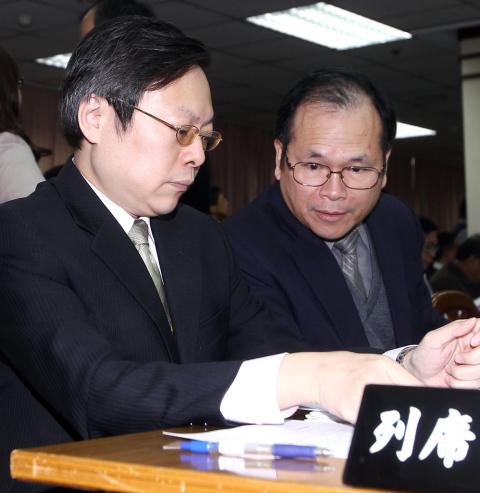Mainland Affairs Council (MAC) Minister Wang Yu-chi (王郁琦) yesterday dismissed Legislative Speaker Wang Jin-pyng’s (王金平) proposal that a “cross-strait affairs panel” be established to report to the legislature to strengthen its supervision of the government, saying that this could lead to a constitutional dispute.
Wang Yu-chi made the remarks before attending the 15th public hearing held by the legislature on the controversial cross-strait service trade agreement.
The legislative speaker put forth the idea on Saturday last week in an attempt to give lawmakers access to cross-strait trade negotiations, saying that the pact caused such controversy because the legislature had been left out of the agreement’s negotiations.

Photo: CNA
He also cited as an example the US’ trade negotiations with other nations, in which two US senators and two US representatives were allowed to participate in and supervise the negotiation process and routinely briefed US Congress on the latest progress.
Lawmakers have made similar suggestions in 2000, proposing that such a panel be led by the legislative speaker and made up of members recommended by various political parties in proportion to the number of their legislative seats.
“There have been calls for the government to set up a mechanism similar to the one implemented by the US for its trade talks to allow [the legislature] to participate in cross-strait trade negotiations. However, the US Congress is only allowed to join the negotiations because it is given the power by the US Constitution to regulate trade with other nations,” Wang Yu-chi said.
The minister added that only a handful of nations, including the US, but not including Taiwan, granted their parliaments such a right.
“The public is advised to take into account the reasons these nations designed their constitutions differently when discussing [the possibility of forming such a panel] to avoid a constitutional conflict,” Wang Yu-chi said.
Democratic Progressive Party caucus whip Ker Chien-ming (柯建銘) said on Saturday last week that the party planned to place Wang Jin-pyng’s proposal on the agenda for the next legislative session, which is to begin on Feb. 21, “as the nation cannot afford to wait any longer.”
Meanwhile, Wang Yu-chi yesterday pledged to stand firm on the government’s position on cross-strait relations during his planned visit to China.
The government’s principal policy toward China remains unchanged — maintaining the “status quo” of “no unification, no independence, no use of force” based on the Republic of China Constitution, Wang Yu-chi said.
The MAC minister is expected to travel to China in the middle of next month to meet with his Chinese counterpart, Taiwan Affairs Office Director Zhang Zhijun (張志軍).
It will be Wang’s first visit to China in his official capacity and the first formal meeting between the two officials tasked with handling ties across the Taiwan Strait.
Seeking to keep Wang Yu-chi on a tight leash during the trip, legislators reached a cross-party consensus last week to forbid him from embarking on any negotiations, signing any papers or issuing any news releases or statements on such political issues as “one China,” the “one China framework,” “one country, two regions,” a “military confidence-building mechanism,” “peace agreement,” or “political relations arrangement in stages.”
The legislators also require that Wang Yu-chi should not accept or echo claims that put the nation’s sovereignty at risk, such as the “one China framework,” or “opposition to Taiwan independence.”
Additional reporting by Tseng Wei-chen

Chinese spouse and influencer Guan Guan’s (關關) residency permit has been revoked for repeatedly posting pro-China videos that threaten national security, the National Immigration Agency confirmed today. Guan Guan has said many controversial statements in her videos posted to Douyin (抖音), including “the red flag will soon be painted all over Taiwan” and “Taiwan is an inseparable part of China,” and expressing hope for expedited reunification. The agency last year received multiple reports alleging that Guan Guan had advocated for armed reunification. After verifying the reports, the agency last month issued a notice requiring her to appear and explain her actions. Guan

GIVE AND TAKE: Blood demand continues to rise each year, while fewer young donors are available due to the nation’s falling birthrate, a doctor said Blood donors can redeem points earned from donations to obtain limited edition Formosan black bear travel mugs, the Kaohsiung Blood Center said yesterday, as it announced a goal of stocking 20,000 units of blood prior to the Lunar New Year. The last month of the lunar year is National Blood Donation Month, when local centers seek to stockpile blood for use during the Lunar New Year holiday. The blood demand in southern Taiwan — including Tainan and Kaohsiung, as well as Chiayi, Pingtung, Penghu and Taitung counties — is about 2,000 units per day, the center said. The donation campaign aims to boost

The Kaohsiung Tourism Bureau audited six hotels in an effort to prevent price gouging ahead of Korean band BTS’ concert tour in the city scheduled for Nov. 19, 21 and 22 this year. The bureau on Friday said that the audits — conducted in response to allegations of unfair pricing posted on social media — found no wrongdoing. These establishments included the local branches of Chateau de Chine, Hotel Nikko, My Humble House, and Grand Hai Lai, it said, adding that the Consumer Protection Commission would have penalized price gougers had the accusations been substantiated. The bureau said the Tourism Development Act

The Central Weather Administration (CWA) said a magnitude 4.9 earthquake that struck off the coast of eastern Taiwan yesterday was an independent event and part of a stress-adjustment process. The earthquake occurred at 4:47pm, with its epicenter at sea about 45.4km south of Yilan County Hall at a depth of 5.9km, the CWA said. The quake's intensity, which gauges the actual effects of a temblor, was highest in several townships in Yilan and neighboring Hualien County, where it measured 4 on Taiwan's seven-tier intensity scale, the CWA said. Lin Po-yu (林柏佑), a division chief at the CWA's Seismological Center, told a news conference